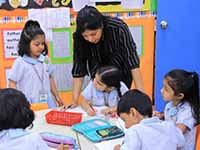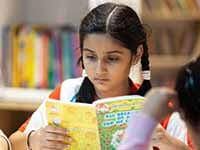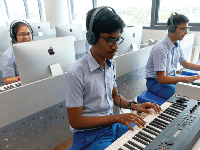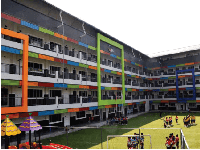Children’s brains grow rapidly from birth to primary years.
It is a good idea to put students of such age in programs where they can learn and develop the four core development areas mainly motor (physical), language and communication, social and emotional, and cognitive.
Brain development is part of cognitive development. Cognitive development describes how a child’s intellect grows, and includes thinking, learning and problem-solving skills. These skills affect all other areas of development.
A lot of times parents struggle to support their children in such areas which are where different education systems step in, especially Montessori education.
Let’s learn some tips on how to support your child’s holistic growth and development in crucial areas:
Tips On How To Support Your Child’s Development In Montessori Years As Advised By An International School
1. The Education System Should Be Very Selective For Children
It is recommended and studies show that Montessori students tend to develop holistically due to the curriculum itself.
Montessori allows the child to develop a sense of self but also be a part of a community and hold accountability.
In Montessori classrooms, teachers are guides and educators and let children explore what they are best at and what they can learn.
The structure is such that children interact with the environment, studying material, and playful material to build curiosity and an urge to explore and learn.
It caters to the unique needs of every child.
Montessori curriculum is very student-centric and in a typical classroom, the walls would be theme painted, children will be found flying solo and also working in teams, and students of different age groups interacting with each other.
2. Exposure To Diverse Cultures In International Schools
If you are an expat or not, it is a great idea to enroll your child in a program that exposes them to diverse cultures.
It makes sure that students interact, respect, and learn to accommodate children from diverse cultures, making them individuals who can agree to disagree and still have faith and love for one another.
It also helps if your child is enrolled in an international school where they experience peer learning and their communication skills become stronger and more impactful.
In a world where there is so much hate, international school students learn tolerance and respect one another.
3. Including Play In Everyday Activities
Play is a very important part of a child’s growth. Playing with different colored blocks, stuffed animals and caricatures help them learn while playing.
In fact, peek-a-boo and games alike help children grow and learn and also spend time by themselves.
Whether it is kitchen sets, legos, swings, outdoor activities all contribute to their holistic development and growth which a Montessori school does.
You can also sing songs, and see their reactions, ask them and explain to them what you are doing helps them learn and grasp quickly.
You can also sing rhymes with them, show them pictures, play with them outdoors, etc to help them understand the world in a fun and realistic way.
Playing hence becomes a very important part of a young child’s growth.
4. Regulating Your Emotions And Coping Skills To Ensure Your Child Learns In A Positive Environment
One study indicates that children do not have a sense of self until they are about 18 months old.
In these cases, it is important to provide a safe and stable environment for the child so they can learn who they are and feel comfortable in any situation.
It is also very important to ensure that children feel calm with those around them, especially their primary caretaker or the school they attend.
Parenting is a difficult job. It might be even more difficult if your child has anxiety and you don’t have time to really nurture them.
The good news is, your child can learn from you if you regulate your emotions, which will help them develop healthier coping skills than those without parents that can regulate their emotions.
Hence, if as a parent you are struggling, you can look into options that help you stay calm by including meditation, yoga, therapy, etc in your life so your child can latch onto your state of mind without feeling the world is a dangerous place.
5. Reading And Telling Stories Through Various Mediums
Reading and showing children pictures and photographs can help them learn quickly. Reading is one of the most effective ways of brain development in a child.
When you read to your child or tell them a story, even if they don’t understand the letter, slowly they start building connections and joining dots and asking questions.
This way repetitive stories and tales can help your child retain information and recognize it in real life as well.
For example, if you tell your child a story about a train and the choo-choo sound it makes when the child sees a train the next time, they can relate it to your story.
Similarly, if it is about a dog, and you make a barking sound and explain how a dog looks, the child will retain this when you ask them about it the next time.
Or if you specifically ask, if it is a dog or a cow, they will know which one it has to be by recalling their long term and short term memory.
6. Healthy Body And Healthy Body For A Child Between 3 To 5 Years
Nutrition is very important for a young child. Make sure you consult your child’s paediatrician to understand what they might need for their holistic development.
A balanced diet is a must. You should include a lot of milk, fruits, vegetables, and grains instead of ready-made fast food.
A healthy body and mind is a way for your child to feel energetic and be able to do things as they like it.
Ensure that you talk to a doctor to understand if anything extra is required that might be a deficiency in your child’s body, ensure to involve natural supplements as long as your child is ready to consume them.
And don’t just preach, but practice eating healthy food as parents too.
Nowadays you can find a ton of healthy recipes for children on the internet with simple everyday ingredients that ensure that your child’s taste buds are also satisfied and so is the nutritional value.
Conclusion
On a happy note, I know there is no right or wrong way of parenting. We all have our limitations but it is in these limitations how we act and raise our children that make a difference.
But these small tips will help you go a long way in raising a child that is mentally and physically strong and healthy and develops all four functions of language and communication, social and emotional, and cognitive in tandem.
Understand your child’s needs instead of expecting them to understand yours, as they are too little to understand. Provide them with the best that you can provide and your child will grow into a healthy adult.
It is very important for a child to have a healthy parent so don’t neglect yourself either. It is also crucial that children feel autonomous and see themselves as the masters of their own destiny.
Give them the opportunity to choose what they want to do, rather than telling them. Slowly build up autonomy while making sure that they feel loved and understood by you.
Montessori education in international schools understands these basic needs of human beings including belongingness which makes a child feel connected and communicates with others including their peers, relatives, friends, family, and other people.






















